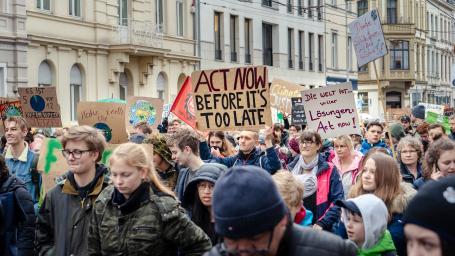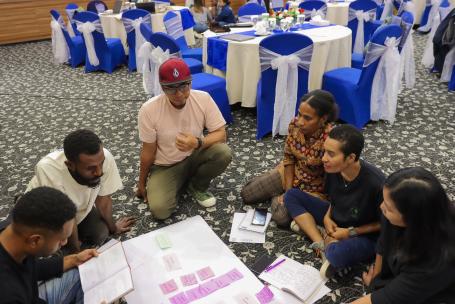
Muda Melangkah: Weaving Hope for the Earth
The latest data from the UN shows that the youth account for 16 percent of the global population.The percentage is even higher in Indonesia, i.e. 24 percent in 2022. This figure is expected to continuously increase. However, the deterioration of the Earth due to the climate crisis threatens the future and well-being of the younger generation.
The injustices experienced by the youth caused by the climate crisis are very real. The majority of environmental degradation is caused by the preceding generations. However, the youth will be facing the worst consequences in the upcoming years. The younger generation are aware of this, especially those who have access to social media and cyberspace. This phenomenon is happening worldwide. One example is Greta Thunberg and her Fridays for Future movement in 2018. The movement has inspired the youth worldwide and Greta was named the youngest Time magazine’s Person of the Year.

Photo: Mika Baumeister/Unsplash
example is Bye-Bye Plastic Bags, initiated by two sisters from Bali, i.e. Melati Wijsen and Isabel Wijsen. In 2013, they managed to reach an agreement with I Made Mangku Pastika, Governor of Bali at that time, to make Bali plastic free by January 2018. They were successful because of their consistent actions, by mobilizing a beach clean-up, making petitions, and even going on a hunger strike. The agreement then prompted I Wayan Koster, Governor of Bali, to issue Governor Regulation No. 97 of 2018 concerning Restrictions on the Generation of Single-use Plastic Waste which came into effect on 1 January 2019. Bye-Bye Plastic Bags now has more than 50 teams of youth spread across the globe.
This shows that the youth have a great desire to play a role in creating a better future. Therefore, efforts to encourage youth participation to protect the environment and fight the climate crisis are crucial. This is the background for youth empowerment activities under "Muda Melangkah".
Muda Melangkah is a youth mentorship program that aims to provide existing youth movement groups with knowledge, guidance, resources, and assistance to catalyze their environmental and climate movements. Under the support of the Think Climate Indonesia – International Development Research Center (TCI – IDRC) project, Muda Melangkah provides a space for the youth to improve their skills, share experiences, discuss and propose solutions suitable according to the local context.
From July 2022 to July 2023, Muda Melangkah engaged more than 80 youth in 4 Muda Melangkah series in Bukittinggi, West Sumatra; Takengon, Aceh; Jayapura, Papua; and Jakarta.

The first Muda Melangkah series was held in Bukittinggi (August 2022) and focused on citizen journalism to increase the participants' ability to share knowledge regarding community efforts to sustainably utilize surrounding forests. The same focus will also be applied to the second Muda Melangkah series held in Takengon (November 2022).
The third Muda Melangkah series was held in Jayapura (March 2023) and focused on the role of youth in protecting forests, including forests in, around and far from cities. In the capital city of Jakarta, the materials focused more on increasing participants' understanding and empathy for the climate injustice occurring in urban communities.
Even though they focused on different topics, a similar approach is used in all Muda Melangkah series. As an interactive training, it started with an explanation of the perspective of gender equality and social inclusion (GESI) which was adapted to the topics discussed. For example, the GESI session in Aceh invited participants to role-play as women, youth and elders who were trying to resolve land conflicts in managing their forests.
In addition, it was not only an indoor training, as the knowledge they gained during the training must be directly implemented in the community. The participants visited a community forest in Nagari Pagadih, West Sumatra; a social forestry group in Bener Meriah, Aceh; a customary forest in Kampung Enggros, Papua; and the coastal area of Cilincing, Jakarta.
Using the transect walk method, more than 80 writing, photos, videos and digital content portraying the community conditions from the eyes of the youth were produced. A digital exhibition was held via Instagram. In Jakarta, participants' work was also displayed in an exhibition at Taman Lapangan Banteng.
Based on the evaluation, all participants felt that the Muda Melangkah series were useful for them and hoped that it would be continued. "The material chosen is very interesting and suits the needs of the youth who want to contribute to conservation," said one of the Muda Melangkah participants in Jayapura.
Apart from the material and series of activities, another thing that participants felt useful was the opportunity to network with other youth who share similar concerns and missions. By getting to know each other and exchanging ideas, they got ideas and inspiration to collaborate in carrying out environmental conservation initiatives in their area.
One of the Muda Melangkah participants in Jakarta said, "I am happy to have met very inspiring and supportive people. They have expanded my horizon and became a support system. We support each other despite our different backgrounds.”
The youth movement does not mean that the responsibility for protecting the environment lies solely on the shoulders of the youth. Efforts to create intergenerational cooperation, where older and younger generations collaborate to jointly overcome the climate crisis, is highly needed.